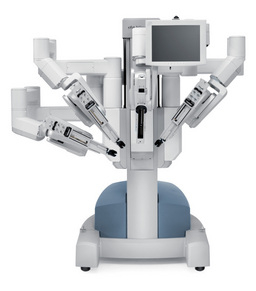Sep 10 2010
Henry Ford hospital in Detroit has introduced a new robotic surgical method called TransOral Robotic Surgery (TORS) for treating head and neck tumors and this medical centre is one of the first in the nation to conduct this innovative surgery with the help of da Vinci Surgical System.
The major features of this robotic surgery include no visible scarring, protecting speech and the capacity to eat.
 TORS Robot
TORS Robot
Tamer A. Ghanem, Director of Head and Neck Oncology and Reconstructive Surgery Division in the Department of Otolaryngology–Head & Neck Surgery, Henry Ford Hospital has stated that when compared to conventional open surgeries, TORS provides quicker recovery after the surgery, enabling the patients to perform their normal activities within a few days of surgery.
He added that using this robotic surgery, surgeons can completely confiscate head and neck tumors and it will not affect major issues like speech, swallowing eating etc. He concluded saying that there will not be any visible scars or mutilation.
The U.S. Food and Drug Administration certified TORS procedures in January for removing both malignant and benign tumors of the tongue, mouth, tonsils and throat. So far Henry Ford hospital has carried out more than 12 TORS procedures.
Traditional treatments like radiation therapy, chemotherapy for mouth and neck cancers can result in deleterious effects like dry mouth, loss of taste, problem in swallowing and belated post-operative recovery etc. whereas TORS does not create any of these ill effects. Conventional surgical interventions demand deeper incisions across the lip and jaw to reach the tumor, which can probably result in distinctive bulging, injury to nearby tissues, speech problem etc. By extending da Vinci’s sleek operating arms through the mouth, the surgeons can reach the tumor, thereby avoiding any incision on the skin.
Dr. Ghanem said that the TORS method reduces the pain and also minimizes the possibility of nerve and tissue injury caused by deeper incisions. He also added that surgeons work with greater accuracy and restraint with TORS.